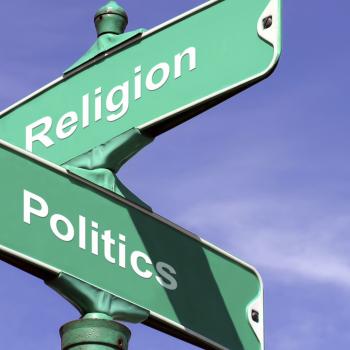The Muslim Monad: Explorations in Identity, Philosophy and the Islamic “State” with Inas Younis
Fed up with the culture of pragmatic moral relativism, the religious right has been pushing for the integration of religion and politics since their inception. But it was not until an equally irrational force of Muslim extremists began making the same claims about religion and politics (without the civilized features of a moral majority style campaign) that the religious right began to wonder if they have been too well behaved in their entire approach.
And so, rather than remain culturally defensive, they have decided to become politically offensive and forgo pragmatism in governing. Hence the Trump presidency.
But what is pragmatism, and how does it help us understand American foreign policy decisions up until this administration?
Simply put, a pragmatist holds that whatever works is good and whatever doesn’t is bad. When your source of political guidance is not religion, pragmatism serves as a pretty decent substitute.
Although it was reason, not pragmatism, that established the principles of a free society, reason fell out of favor when pragmatism took over as a philosophical movement in the 1870s.
Reason, like religion, holds that there are absolute truths. But unlike religion, which relies on subjective human interpretations, it arrives at truths according to objective standards and maintains a strict adherence to certain absolutes. Pragmatism, on the other hand, holds that there are no absolutes, and right and wrong is determined according to what produces the best outcome.
The best outcome for whom, however, does not factor into the ethics of a pragmatist.
A pragmatic approach to policy can work politically but it does not work in principle, except to destroy all principles. Pragmatism is cynical with respect to objective principles of right and wrong. For a pragmatist, the “end always justifies the means,” and the driving force behind decisions is efficiency.
But a country like the United States, a country founded on a set of clearly defined principles and brought together under the banner of an ideology and not based on a shared ethnicity or culture, cannot survive without adhering to the foundational principles that became the basis of its moral and political legitimacy.
Preaching moralism while acting on the Machiavellian in the name of pragmatism has thrust this nation into Alice’s rabbit hole, where nonsense and common sense become interchangeable, and where anyone armed with a consistent ideology, no matter how perverse or dangerous, could inevitability gain a foothold.
From that perspective, Trump’s election was not an aberration but the natural progression of the moral bankruptcy of pragmatism. As pragmatism unravels, religion is now rushing in to stake its claims and assert its superiority.
Caught in the cross fires between this clash of anti-civilizations American Muslims are now seeking shelter behind the narrative that counters religious extremism with liberal leftist politics — a problematic approach given that the left is generally uncomfortable with religious language and tends to only act as a protection in so far as a we can remain powerless.
There is another option, and one that is completely consistent with our identities as Americans and Muslims. And it begins with the rhetoric of Islamic reform.
Islamic Reform Movements
Most religions start out puritanical and modernize over time. Islam took the opposite course. It started out flaming with liberalism. It granted its followers unprecedented freedoms and established a trajectory towards increasing freedoms by deconstructing the notion of religious authority acting as an intermediary between man and God, and it introduced the concept of ijtihad or independent reasoning as a legitimate and very critical part of Islamic jurisprudence. Islam was a religion built on the fluidity of ageless principles and was designed to evolve with the times.
It granted women property rights at time when women were themselves considered property. And, depending on time and place, non-Muslims sought the protection of the Muslim Ottomans because of the religious mandate to protect Christians and Jews from persecution.
This was the esprit de corps that led to the expansion of Islam until it was truncated by the so called “reform movements.” In the beginning of the 10th century many Sunni jurists began suppressing the process of independent reasoning and replaced it with an imitative approach that focused on the enforcement of limitations on thought and behavior.
This imitative approach (taqlid) to religious jurisprudence became the impetus for the growth of totalitarian movements like Wahhabism and its many extremist corollaries around the world. What started out as a stunted little sect in the deserts of Arabia has evolved into a major political force armed with a global curriculum.
Therefore, any modern reform efforts within Islam must start by undoing the corruptions perpetuated by that central governing body currently presiding over its holy sites — the Saudi religious establishment.
Reason is the Way Forward
Our goal as American Muslims is to restore our understanding of Islam as a religion where truth is not determined according to averages but in accordance with certain absolutes. And, our goal to accept that in politics, that truth is bound by the objective standards of reason and not the subjectivity of any religion.
What began as a pragmatic opposition to the political establishment by the right wing has rapidly deteriorated into open hatred for the “other.” Rather than returning to the American tradition of principled leadership and nonnegotiable ideals of individual rights and objective law, they are renouncing pragmatism for something far worse — radicalism.
The rise of the right wing from the fringes of society into the mainstream was, among other things, our nation’s suicidal response to Islamic extremism. One can only hope that this clamoring to take ownership of American values by renouncing the Americanism that has been our way of life, where individual rights are sacrosanct and where all men are created equal, will merely be a detour in our eventual restoration to the principles of reason.

Reason is the only universal standard of political theory. Historically, reason has been the only approach in political philosophy which has ever worked and the only approach that is completely consistent with Islam and its universal call for justice.
Inas Younis is a Kansas City-based freelance writer and commentator. Her opinion pieces and personal essays have been published in various websites and magazines. Inas is an active volunteer in several interfaith initiatives and serves on the board of the Sisterhood of Salaam Shalom. She is also a contributor to a forthcoming 400-page community-led guide, aimed at mobilizing Muslims to take a stand against violent extremism and develop narratives of peace. Her work was featured in an anthology titled “Living Islam Out Loud.” Her column appears in Altmuslim during the first week of every month.













